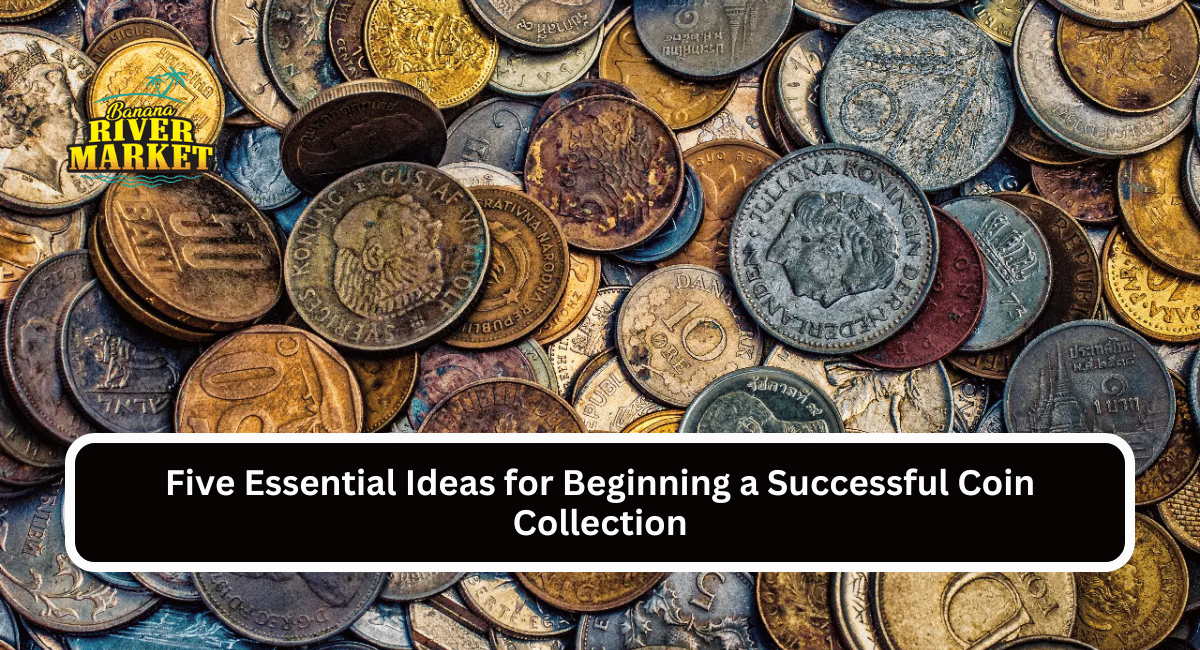With the correct attitude and information, coin collecting can be both an enjoyable pastime and a profitable investment. Coins provide a unique fusion of cultural significance and possible financial gain, regardless of your passion for history or the potential economic gain of a carefully chosen collection.
1. Establish Specific Goals for Gathering
Having a defined objective from the outset will help you focus your collection and direct your purchases. Do you wish to amass a collection of historically essential coins, or are you primarily collecting them for financial gain?
While certain collectors seek rare U.S. coins, commemoratives, or even mint faults, others concentrate on ancient coins. You may increase your chances of finding undervalued treasures by focusing on and learning more about one subject.
Advantages of Specialization
Focusing on a niche may help you better understand that market and develop a valuable collection. Additionally, serious consumers who might be prepared to pay more for carefully chosen goods are drawn to specialized collections.
2. Study the Fundamentals of Coin Grading and Condition
To determine a coin’s actual value, one must comprehend coin grading. The Sheldon Scale grades coins from Poor (P-1) to Mint State (MS-70). Coins with better grades typically fetch greater values. Essential elements consist of:
- Luster: The sheen of a coin’s surface, particularly uncirculated.
- Strike: The design’s depth and clarity.
- Surface Marks: Any blemishes, dents, or other flaws that might reduce the grade.
Since the value of high-grade coins tends to increase more steadily, investing in them frequently pays off. Consider having high-value pieces validated by a respectable grading agency, such as PCGS or NGC, as this can increase the coin’s worth and lend legitimacy.
3. Purchase from Reputable Suppliers
It’s just as crucial where you purchase your coins as what you purchase. Choose reliable vendors and suppliers to steer clear of fakes and expensive goods. Here are a few trustworthy places to buy:
- Authorized Coin Dealers: Select authorized coin dealers who are members of respectable associations such as the American Numismatic Association (ANA).
- Auction Houses: Certified coins with confirmed authenticity are available from businesses like Stack’s Bowers and Heritage Auctions.
- Online marketplaces: Seek vendors who provide certified coins, refund policies, and excellent reviews.
Purchasing from reliable vendors reduces the possibility of fakes and guarantees that the value of your collection will increase over time.
4. Pay Attention to Market Trends
The coin market is subject to volatility, just like any other investment. However, keeping up with trends can facilitate smart purchases and sales. Historical anniversaries or growing collector interest may cause the value of some coins to rise, while other coins may take longer to appreciate.
Keeping Up to Date:
- Publications: Current trends are discussed in numismatic journals such as Coin World.
- Online forums: Participating in forums lets you stay informed on market movements and popular currencies.
- Auction Results: Examining auction results enables you to gauge the level of demand for particular coins.
Knowing these patterns can help you make wise purchases that will increase the value of your collection.
5. Keep Your Coins Safe and Stored
Proper storage is essential to maintain a coin’s value and quality. Coins may get damaged by handling, dampness, and even temperature changes. A few best practices are as follows:
- Use Holders: Coin flips or capsules made of plastic offer some scratch and dust resistance.
- Handle Caution: Only touch coins by their edges to prevent transmitting skin oils.
- Environment of Control: Because excessive humidity can harm metals like copper and silver, keep coins in a cool, dry place.
Coins kept in top shape maintain their grade and appeal to potential purchasers, which may, over time, increase their profitability.
Quick Comparison Table for Profitable Coin Collecting
| Tip | Description | Benefit | Example |
|---|---|---|---|
| Set Goals | Define your focus for historical or financial value | Guides purchases, narrows focus | U.S. Coins, Ancient Coins |
| Understand Grading | Learn coin grading basics to assess value | High-grade coins hold value better | MS-70 vs. lower-grade coins |
| Buy from Reputable Sources | Choose certified dealers and trusted auctions | Avoids counterfeits, ensures quality | ANA dealers, Heritage Auctions |
| Follow Market Trends | Stay updated on which coins are gaining or losing popularity | Helps you time buys and sells for profitability | Trendy commemorative coins |
| Store Properly | Keep coins in protective cases and stable environments | Maintains condition, enhances resale value | Plastic capsules, dry storage area |
Whether you’re a casual collector or aiming for a serious investment, these practices can make your coin collection more profitable over time. With patience, knowledge, and the right approach, coin collecting can provide both enjoyment and potential financial rewards.
FAQs
1. What is the minimum amount required to begin a successful coin collection?
You may begin with a little budget and prioritize quality over quantity. In good condition, even low-denomination coins might eventually generate profits.
2. How can I assess the value of a coin?
Value is influenced by grade, historical relevance, rarity, and present demand. A coin’s value can be accurately estimated by consulting reliable pricing guides, grading services, or recent auction results.
3. Should I concentrate on high-quality, contemporary coins or uncommon coins?
Your hobbies and finances will determine this. While certain contemporary coins with restricted mintages are also appreciated, rare coins often have a set value. Many collectors combine the two to take a balanced approach.
4. Is expert grading required?
High-value coins should be professionally graded, particularly by PCGS or NGC, since this can increase their resale value and lend credibility.
5. How frequently should I check the worth of my coins?
Because coin prices change according to market trends and demand, checking regularly or yearly is a good idea.
READ MORE: Five Must-See Coin Collections of the Rich and Famous

